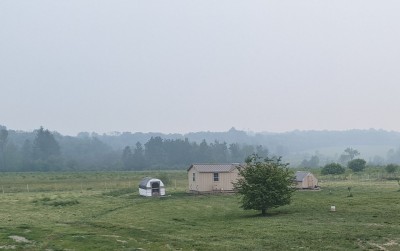Wildfire Smoke - What Can we do for our Livestock?
Amy Barkley, Livestock Specialist
Southwest New York Dairy, Livestock and Field Crops Program

Wildfire Smoke - What Can we do for our Livestock?
Wildfires are an annual occurrence in many areas of the world. New York typically doesn't experience wildfires, but with the wildfires raging in Canada, smoke has been drifting into the state for the past few days and may continue to do so until the fires are extinguished. The smoke has resulted in air quality concerns, which can affect livestock as well as people.
The particles that we're most worried about are known as PM2.5. These particulates can cause eye and respiratory tract irritation. Animals with weakened immune systems, such as the very young, old, and sick, may develop symptoms that include the following, shared by Oregon State University:
- Coughing or gagging
- Difficulty breathing, including open mouth breathing and increased noise when breathing
- Eye irritation and excessive watering
- Inflammation of throat or mouth
- Nasal discharge
- Asthma-like symptoms
- Increased breathing rate
- Fatigue or weakness
- Disorientation or stumbling
- Reduced appetite and/or thirst
If you see any of the above conditions in your animals, please consult a veterinarian for assistance and treatment.
Research for livestock wildfire smoke inhalation is ongoing in wildfire prone states, and most of the data is from studies where animals were exposed to high levels of smoke near the perimeter of a wildfire. Because of the distance we are from the Canadian wildfires, it can be extrapolated that there will be some effects on NYS livestock, but they won't be nearly as severe or long-lasting as what we see in other areas of the country. Poultry will be more affected than mammals because of their unique respiratory system design.
Given what's currently going on, livestock owners wonder if there is anything they can do now to keep their livestock safe and healthy. The following are best management practices to reduce the effects of being in a smoky environment or environment where the air quality index is poor:
- Move the animals into an area with filtered air, if possible.
- Modify the environment to reduce dust in the air, which can help offset some of the challenges caused by smoke exposure. Dampening bedding or feeding pellets instead of mash feeds are two ways to reduce dust.
- Reduce stress in the animals' environment.
- Limit working animals' work, including running, pulling, or herding, especially when smoke is visible. This will help reduce the amount of small particulate matter that makes its way into the respiratory system.
- Provide feed and water in abundance in accordance with the animals' nutritional needs. Full and hydrated animals are healthier and more prepared to experience these types of environmental health challenges.
Following exposure to a smoky environment, allow time for the animals to heal. This can mean limiting handling or transporting animals, especially those which are showing symptoms or distress from smoke inhalation. Research indicates that in heavy exposure scenarios, it may take 4-6 weeks for the animals' respiratory system to fully heal, especially for those that are experiencing any of the symptoms listed above.
References:
How to Protect Pets and Livestock from Wildfire Smoke: https://extension.oregonstate.edu/animals-livestock/beef/how-protect-pets-livestock-wildfire-smoke
Wildfires, Smoke, and Livestock: https://cecentralsierra.ucanr.edu/files/220420.pdf
Photo: Smoke hangs heavy in the air at a poultry farm in Southern Erie County on June 7, 2023. Photo by Amy Barkley.
Upcoming Events
WEBINAR - Automated Milking Systems Efficiency: Balancing Focus on Individual Cows and System Optimization
May 8, 2024
Please join Cornell the SWNY team and MSU Extension for our talk with Dr. Pablo Silva Boloña on improving efficiency of Automated milking systems by focusing on milking settings for individual and group success.
Broiler Field Day at Sunny Cove Farm
June 6, 2024
Alfred Station, NY
Join us for a field day to explore broiler production, processing, and finances. Meghan Snyder of Sunny Cove Farm will be our host. She raises small batches of organic broilers, processing them on-farm under the 1,000 bird exemption.
Stockmanship and Stewardship 2024
October 25, 2024
Hamburg, NY
Save the date!! The event is one of 4 across the US and is a two-day educational experience featuring low-stress cattle handling demonstrations, Beef Quality Assurance educational sessions, facility design sessions, and industry updates.
Announcements
No announcements at this time.





